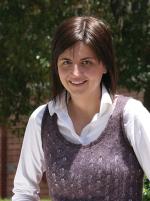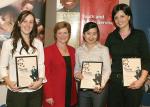Branka our Young Investigator
 Immunology Immunology
Adelaide PhD student Branka Grubor-Bauk estimates she has already lived three lives in one - and her recent success in a prestigious competition could well be the start of life number four! The 28-year-old won the final of the 2005 Young Investigator Award, conducted jointly by the University's Faculty of Health Sciences and the Children, Youth and Women's Health Service for her research into the herpes simplex virus. The Award, now in its sixth year, rewards research excellence by young Adelaide health researchers and their ability to "sell" their science in lay language. It's another major step in Branka's journey that has seen her come to Australia as a Serbian refugee from the 1990s Balkans War. "In a way it's like I've lived three lives," she said. "The first one was growing up in Sarajevo, the second was becoming a refugee through the war and then the third one was having the opportunity to come to Australia and make a fresh start. "What I like about Australia is that if you're willing to work hard, then the opportunities to succeed will come. "I was very nervous on the Finals night. I had a cold and wasn't feeling well, but it was a great opportunity to present my research and my findings to a wider audience, and it was very exciting and surprising to win." Branka is undertaking her PhD through the University's School of Molecular and Biomedical Science, and the Institute of Medical and Veterinary Science's Infectious Diseases division. She is studying how the body's immune system reacts to and fights the herpes simplex virus, which is estimated to affect 95% of the world's adult population at some stage in their lives and is the world's second most common cause of blindness. "The immune system treats foreign invaders it finds in the body in two ways: what it does first is send out non-specific immune cells, cells that are designed to destroy any foreign invader. "After a while it then begins to send out specific cells, once it has determined what the foreign invader is. But this can take a long time and what we are trying to do is work out how to improve the communication between these two types of immune cells, the non-specific and the specific." Using mice, Branka has studied a particular type of specific immune cell known as a natural killer T-cell (or NKT) and its effect on herpes.
"For the first stage of the study, we looked at mice who didn't have NKT cells and their resistance to herpes. "Their survival rate went from the 90% of a normal mouse to 33%, and they were affected much more by the virus, getting much bigger lesions on their skin and more of the virus in their body. "For the second stage, we gave normal mice extra NKT cells to see what would happen. They went from an average of 70% having skin lesions to only 20%, and the amount of the virus in their system was reduced by 100 times. "Both findings strongly suggest that NKT cells have a major role to play in controlling the herpes virus." The other two finalists in the Young Investigator Award were also both University of Adelaide PhD students. Brooke Summers, through the IMVS's Clinical Biochemistry division and the Hanson Institute, is researching whether zinc can protect foetuses against the effects of a mother's binge drinking, while Adeline Lau, through the Women's and Children's Hospital's Lysosomal Diseases Research Unit, is studying whether a modified virus can direct a treatment protein into the brains of mice suffering from a lysosomal storage disorder. Story by Ben Osborne
|






